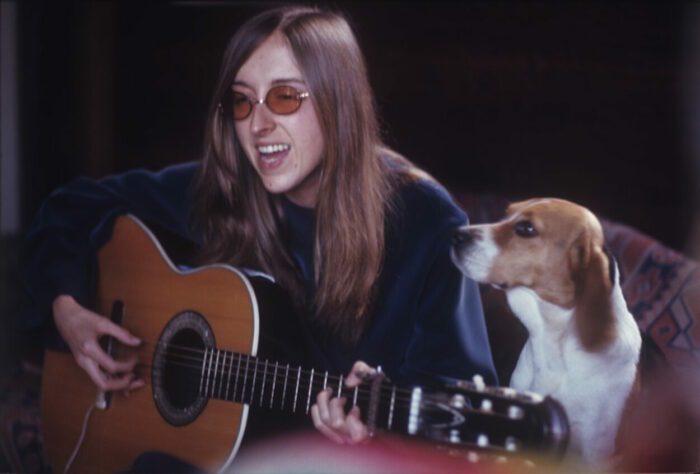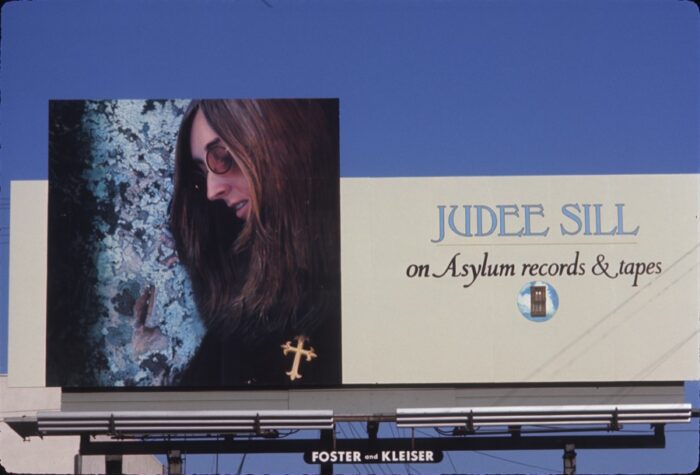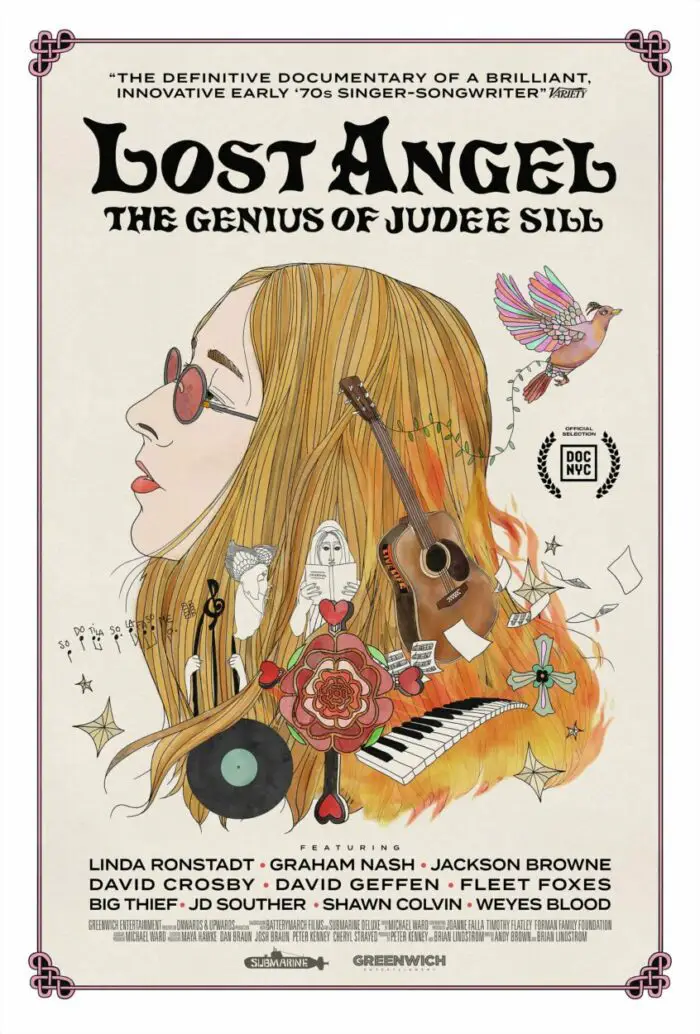Lost Angel: The Genius of Judee Sill is a tragic reminder that talent is no guarantee of success. Though it happened decades after her demise, singer-songwriter Judee Sill is finally reaching the wider audience she never garnered in her lifetime. While the stories and details of her days are often interesting, what the documentary lacks is anything visually compelling. Lost Angel: The Genius of Judee Sill is almost a lengthy podcast masquerading as a movie. But that doesn’t make its subject any less worthy of attention.
The film follows the life and career of Judee Sill. Details mostly unfold through a collection of interviews featuring several notable music figures from the 1970s. These include but are not limited to David Crosby, Linda Rondstadt, Jim Pons, J.D Southern, and David Geffen. Sprinkled throughout are conversations with friends and family. It’s a wonderful assortment of anecdotes painting a colorful portrait. Meanwhile, bits of her personal journal accent anecdotes as do newspaper articles which backup lurid accounts of a wild youth.

Not many audio interviews exist, so to flesh out the Judee Sill side of the story the documentary leans heavily on one set of tapes and adds in voice actress Sonya Godding. The performed portions blend so smoothly it’s often hard to tell when lines attributed to Judee, typically taken from her journals or print Q&As, are Godding or a recording of the real person. Most of her story, though, comes from the people who knew her.
Lost Angel: The Genius of Judee Sill permits the image of someone delightfully free spirited yet rough around the edges. Her various facets present a flawed but compelling person so painfully human it’s easy to see the depth of her soulful lyrics. She sometimes comes across as someone who was easy to love yet never felt loved the way she wanted. Still, the pain of bad relationships turned out to be fuel for phenomenal tunes like “Jesus was a Cross Maker”. It’s these examinations of certain songs’ origins which provide an interesting insight into her writing process while also exploring her personality. Lost Angel: The Genius of Judee Sill makes it plain how much of her is in the two albums Judee Sill (1971) and Heart Food (1973).
Audiences are taken on a journey through tumultuous teenage years which bred a veritable outlaw. Besides armed robbery, there’s an interesting anecdote about her doing heroin to ease the pain of fingers bloodied while playing standup bass at a club all night. That reckless abandon, the ability to give herself so completely to her art — the documentary makes it clear Judee Sill possessed an unparalleled passion that was a double-edged sword, cutting her a path through life as well as chopping her down.

Biographies that don’t reveal any flaws should never be trusted. Fortunately, Lost Angel: The Genius of Judee Sill is willing to explore aspects of its subject which aren’t always flattering. Suffice it to say, she never learned how to play well with others, and some decisions, particularly romantic ones, are, in hindsight, obvious mistakes. Yet, directors Andy Brown and Brian Lindstrom rarely make the misstep of trying to justify her actions. They simply present what occurred as the facts they are. Though these aren’t things that will necessarily alienate an audience, they humanize Judee Sill in a way the film’s title doesn’t.
Perhaps the most interesting portions of Lost Angel: The Genius of Judee Sill are the sections covering her musical process. Of course, the tales of her wayward youth are entertaining, but there’s something about her compositions that I don’t think the filmmakers intended. Sometimes these are juxtaposed with covers of her songs. The documentary even opens with the band Fleet Foxes performing “The Kiss” which then transitions into Judee Sill’s rendition and the difference is staggering.
The emotion in her music is far more tangible coming from her than anyone else in the doc trying to replicate it. As such, Lost Angel: The Genius of Judee Sill makes it clear that creating affecting art isn’t the same as performing it. Anyone can play the notes and sing the words, perhaps even expertly, but few can convey the honest emotions or the vulnerability that makes Judee Sill’s songs so moving. Yet, these shallow mimics still shine because of how high-quality her work was.

Still, despite various insights and amusing anecdotes, there isn’t a terrible amount of material to build a full-length feature around. Not much archival footage exists of concerts. There isn’t a galaxy of personal or publicity photos. Television interviews appear to be nonexistent. Consequently, Lost Angel: The Genius of Judee Sill tries to flesh itself out with animations most of which are inspired by content in her journals.
Though mildly interesting at first, this filler fails to be entertaining throughout. As the repetition of certain photos becomes boring, the documentary begins struggling to keep eyes on it. That’s not to suggest the material itself is without interest. It’s simply to say that someone listening to Lost Angel: The Genius of Judee Sill will get just as much out of the documentary as watching it.
That said, it’s almost worth mentioning this isn’t the first documentary to explore the life of Judee Sill. Back in September of 2014, BBC Radio 4 aired an audio doc entitled The Lost Genius of Judee Sill. It contains a lot of the same information which is to be expected given the limited facts available. When there’s only one interview to replay, two different documentaries will sound dreadfully similar. However, Lost Angel: The Genius of Judee Sill contains several more personal accounts of her life as well as a deeper exploration of her creative process.
In it, Judee Sill often comes across like habanero sugar. Fiery yet sweet, her unique style of self-described, “occult-holy-western-baroque-gospel” music never caught on. But getting to know her better over the course of Lost Angel: The Genius of Judee Sill makes her music all the more meaningful and accessible.


